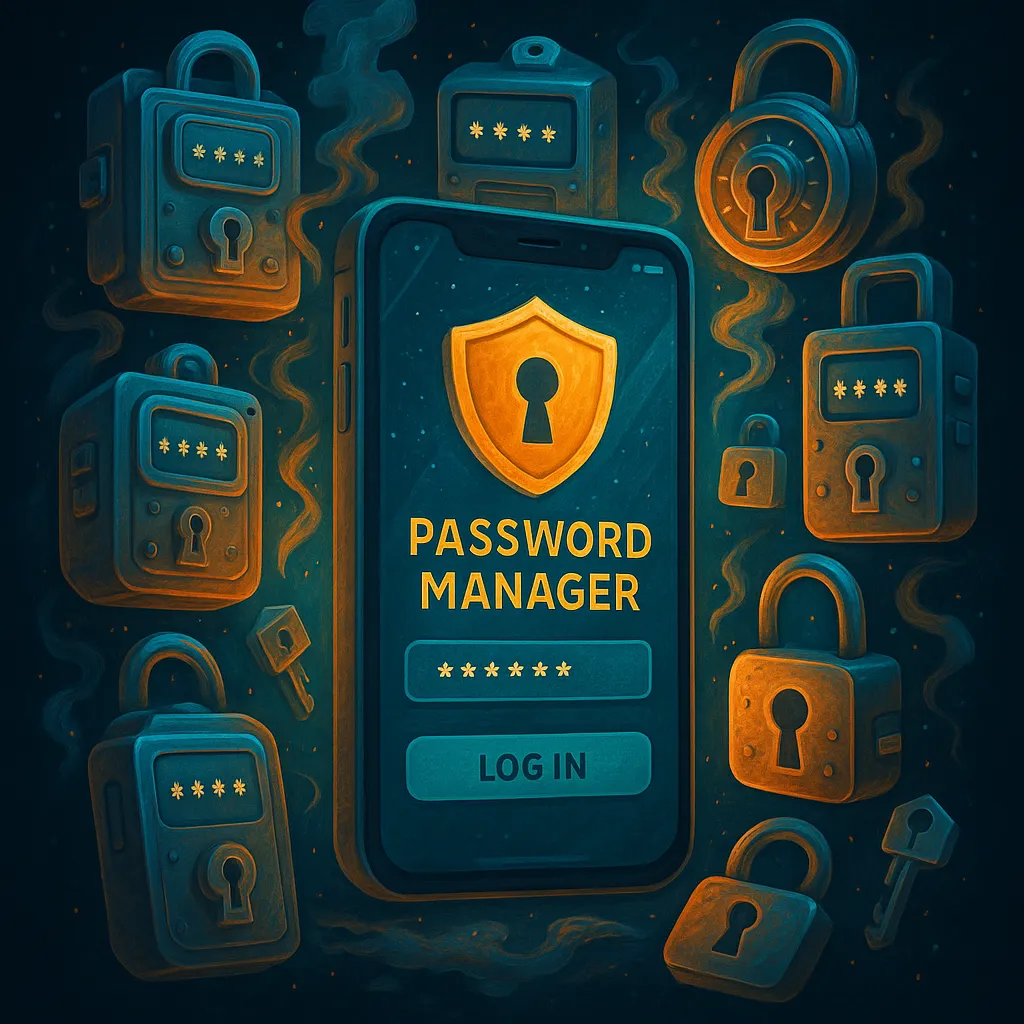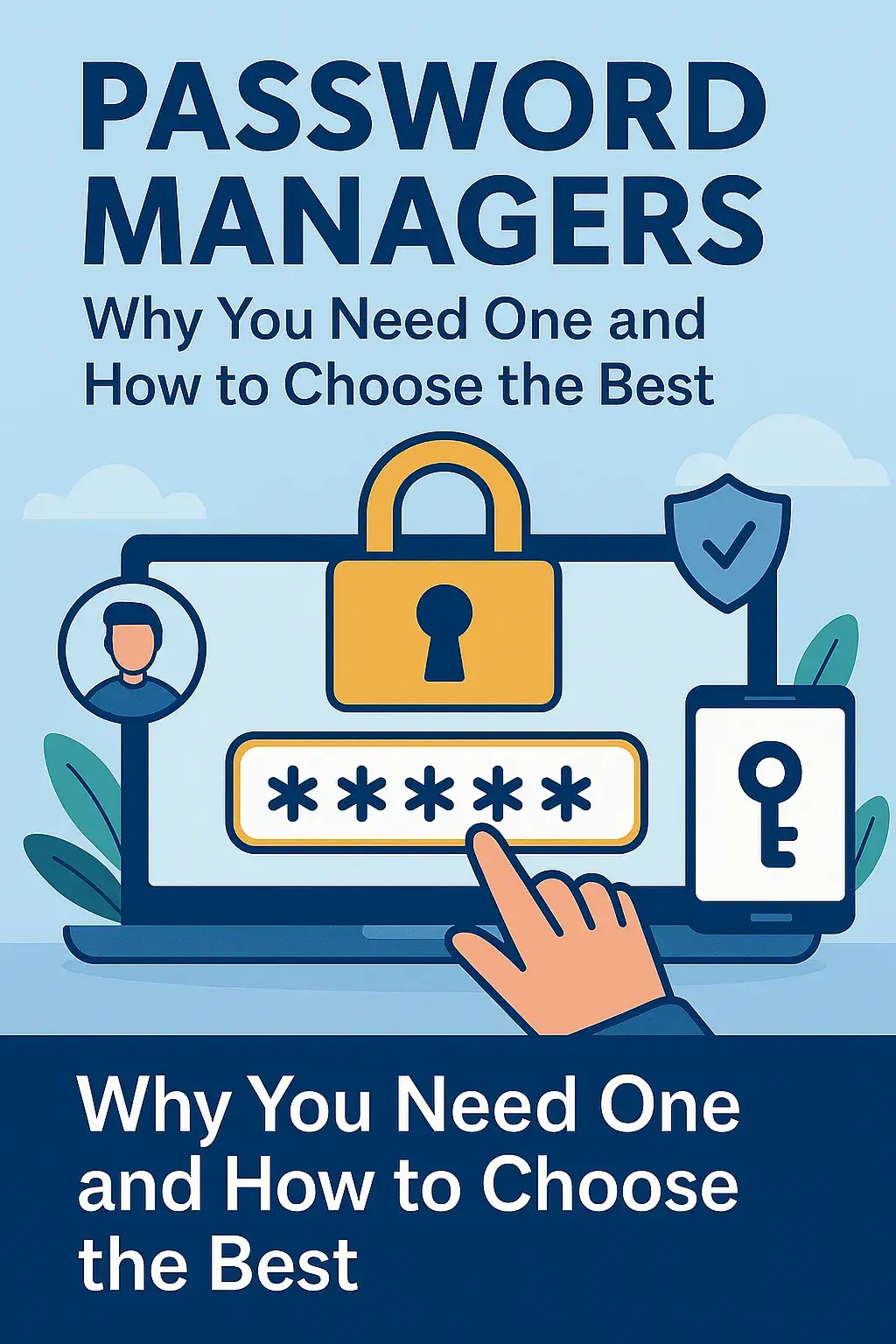🔐 The Ultimate Guide to Protecting Your Digital Life
⚠️ Disclaimer
This article is written for educational and ethical purposes only. The goal is to help individuals and organizations improve their digital security and protect themselves from cyber threats.
🔐 What Is a Password Manager?
A password manager is a secure software application that helps you generate, store, and manage your passwords in one centralized, encrypted location. Instead of remembering dozens (or hundreds) of complex passwords, you only need to remember one master password to access your password vault.
Password managers can:
- Generate strong, unique passwords for each of your accounts
- Automatically fill in login forms on websites and apps
- Synchronize your credentials across devices (desktop, mobile, browser)
- Alert you about weak, reused, or compromised passwords
- Store other sensitive data securely (e.g., credit cards, secure notes)
Most modern password managers use end-to-end encryption, meaning even the provider cannot access your stored data.
Popular examples include 1Password, Bitwarden, Dashlane, and LastPass.
🚩 Why Password Managers Are No Longer Optional
Let’s be blunt: humans were not designed to remember 100+ complex, unique passwords. And yet, the average person now has over 90 online accounts.
This leads to dangerous habits like:
- ❌ Reusing the same password across sites
- ❌ Creating weak, predictable passwords (Summer2024!)
- ❌ Writing passwords on sticky notes or saving them in password.docx
According to the 2023 Verizon Data Breach Investigations Report, over 80% of hacking-related breaches involve weak or reused passwords.
📆 Timeline of Major Password Leaks (2009–2025)
| Year | Company / Service | Accounts Affected | Notes |
|---|---|---|---|
| 2009 | RockYou | 32 million | Plaintext passwords exposed |
| 2012 | 117 million | Weakly hashed passwords using SHA-1 | |
| 2013 | Adobe | 153 million | Email addresses and passwords leaked |
| 2014 | eBay | 145 million | No financial data, but personal data stolen |
| 2016 | MySpace | 360 million | One of the largest historical breaches |
| 2019 | Collection #1 (combo list) | 773 million | Aggregated leak from many sources |
| 2020 | Zoom | 500,000+ | Credentials sold on dark web |
| 2021 | Facebook (scraping) | 533 million | Phone numbers, emails leaked publicly |
| 2023 | T-Mobile | 37 million | SIM data and customer records exposed |
⚠️ Lesson: Even strong companies suffer breaches.
Password managers help contain the damage by isolating each password.
✔️ Password managers solve this.
They create, store, and manage strong, unique passwords for every account — so you don’t have to remember them.
🔐 What Is a Password Manager?
A password manager is an app that stores your login credentials in an encrypted vault. You unlock this vault with a single, strong master password.
The password manager:
- ✅ Generates strong, random passwords
- ✅ Autofills login forms securely
- ✅ Syncs passwords across devices (phone, laptop, tablet)
- ✅ Stores additional secure notes (2FA backup codes, Wi-Fi keys, banking info)
🏗️ How Password Managers Work — Simple Breakdown
┌───────────────────────────────┐
│ YOU (the user) │
└────────────┬──────────────────┘
│
▼
Enter Master Password
│
▼
┌───────────────────────────────┐
│ Password Manager Application │
└────────────┬──────────────────┘
│ Decrypts vault using
│ master password
▼
┌───────────────────────────────┐
│ Encrypted Password Vault │◄────────────┐
└────────────┬──────────────────┘ │
│ Secure AES-256 Encryption │
▼ │
Autofill credentials on websites │
│ │
▼ │
Sync across devices (cloud or local) │
│ │
▼ │
Add/Edit entries: logins, notes, 2FA codes ─┘- You create one master password — this is the only password you ever need to remember.
- The manager encrypts all your stored passwords locally or in the cloud.
- When you visit a login page, the manager fills in the credentials securely.
- On new devices, you log in with your master password — often combined with two-factor authentication (2FA) for maximum security.
🏆 Why Password Managers Are Safe — and Safer Than the Alternatives
🔐 ✔️ How they protect you:
- Use AES-256 encryption, the same standard used by banks and governments.
- Store data encrypted at rest and in transit.
- Many use a zero-knowledge model — the provider cannot see your data, even if they wanted to.
🚫 Far safer than:
- Writing passwords in notebooks or sticky notes
- Using the same password everywhere
- Saving passwords in your browser (which is a weak form of storage without encryption)
🚀 Top Features to Look For
✅ Must-haves:
- AES-256 encryption
- Zero-knowledge architecture
- Two-factor authentication support (2FA)
- Secure password sharing
- Cross-platform sync (Windows, macOS, Linux, iOS, Android)
- Encrypted backup
⭐ Nice-to-haves:
- Dark web monitoring (alerts if your credentials are leaked)
- Secure file storage
- Emergency access for family members
- Biometric unlocking (Face ID, fingerprint)
- Password health reports
🏆 Best Password Managers in 2025 — Compared
| Password Manager | Pros | Cons |
|---|---|---|
| Bitwarden | Open-source, free plan, very secure | Simpler interface, fewer extras |
| 1Password | Beautiful design, travel mode, reliable | No free version, subscription only |
| Dashlane | Great UI, dark web monitoring, VPN | Pricier, fewer customization options |
| Keeper | Zero-knowledge, biometric login, secure file storage | Slightly more expensive |
| NordPass | Simple, affordable, works well with Nord ecosystem | Fewer advanced features |
🔥 How to Choose the Best Password Manager for You
✅ Consider these questions:
- Do you need an open-source solution? → Bitwarden
- Do you prefer a beautiful interface and travel mode? → 1Password
- Want built-in dark web monitoring or VPN? → Dashlane
- Need ultra-secure file storage? → Keeper
- Want simplicity with lower cost? → NordPass
If you’re just starting, Bitwarden (free) is an excellent choice with all the essentials.
🧠 What Happens If You Forget Your Master Password?
🔐 With most managers:
- They cannot reset it for you (zero-knowledge security).
- Some offer emergency recovery via trusted contacts (1Password, Dashlane).
- Others rely on recovery keys or biometric backups (Bitwarden, Keeper).
Important:
→ Your master password should follow the passphrase method (e.g. Blue!TigerRainCoffee*). See the strong password article for how to build one.
🛠️ How to Set Up a Password Manager — Step-by-Step
Example with Bitwarden:
- Visit bitwarden.com
- Create an account → Choose a strong master password
- Set up 2FA for extra protection
- Install the browser extension + mobile app
- Import existing passwords (optional)
- Start generating new, unique passwords for each account
- Enable password health check (find reused or weak passwords)
- Backup your master password somewhere secure (physically or via secure encrypted note)
🚫 Common Mistakes to Avoid
- ❌ Using a weak master password
- ❌ Forgetting to enable 2FA for the manager itself
- ❌ Not saving backup codes or recovery keys
- ❌ Storing passwords in browser instead of a dedicated manager
- ❌ Ignoring password health reports
🏴☠️ Real-World Example — Password Manager vs Data Breach
In 2022, a major gaming platform suffered a massive data breach. Millions of usernames and passwords were leaked.
Users who reused passwords had their accounts stolen instantly.
Those using password managers? They were unaffected — their unique, random passwords were not part of any breach.
💡 Lesson: A password manager doesn’t stop data breaches, but it prevents one breach from becoming 50.
🚀 Checklist — Password Manager Best Practices
- 🔲 Choose a reputable password manager
- 🔲 Create a strong master passphrase
- 🔲 Enable 2FA on your password manager
- 🔲 Use unique passwords for every account
- 🔲 Regularly check password health reports
- 🔲 Backup recovery codes or keys securely
- 🔲 Never store passwords in browsers or plain text
❓ FAQ
❓ Do password managers get hacked?
Yes, but rarely — and most use zero-knowledge encryption, which means attackers can’t read your data even if servers are breached. For example, Bitwarden and 1Password were never compromised in ways that exposed user vaults.
❓ Isn’t using a password manager a “single point of failure”?
It can be — if you use a weak master password. But if you:
- Use a strong, unique passphrase
- Enable 2FA
- Save recovery keys securely
→ the risk is dramatically reduced.
❓ Are browser-based password managers safe?
They’re better than nothing, but not ideal:
- No zero-knowledge model
- Vulnerable to browser exploits or malware
- Limited feature set (no dark web monitoring, no sharing, etc.)
Dedicated apps like Bitwarden or 1Password are much safer.
❓ What happens if my password manager goes offline?
Most managers (like Bitwarden, 1Password) offer offline access to cached vaults on your device. You won’t lose access, but syncing may be delayed until connection is restored.
❓ Can I use a password manager for shared family or team accounts?
Yes. Many offer secure sharing features (e.g., Bitwarden Organizations, 1Password Families, Dashlane Teams).
🏆 Final Thoughts
In 2025, a password manager is no longer a luxury — it’s a basic requirement for digital survival.
Strong passwords + a good password manager + 2FA = 99% of your personal cybersecurity covered.
→ Hackers don’t break strong encryption — they break human laziness. A password manager eliminates that weak link.

✅ Final Note
Sources referenced:
- Verizon Data Breach Investigations Report (DBIR) 2023
- CISA (Cybersecurity and Infrastructure Security Agency) best practices
- OWASP (Open Web Application Security Project) Password Storage Cheat Sheet
- NIST Digital Identity Guidelines (NIST SP 800-63B)
- Security blogs from Bitwarden, 1Password, Dashlane
